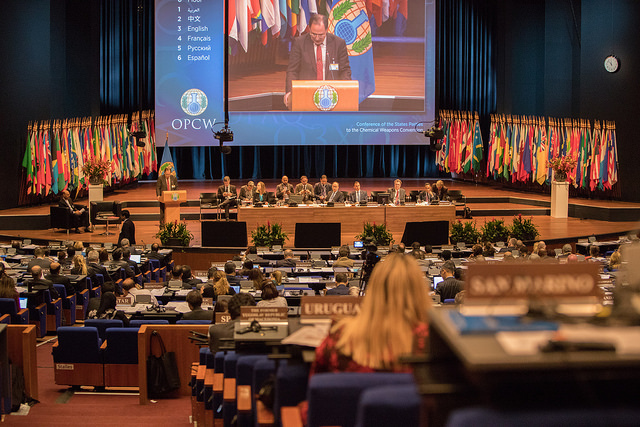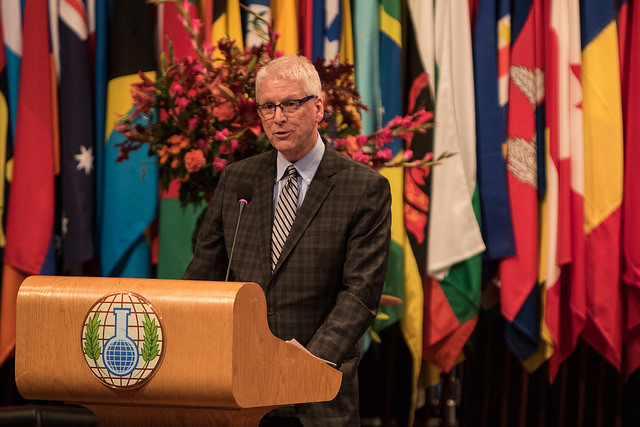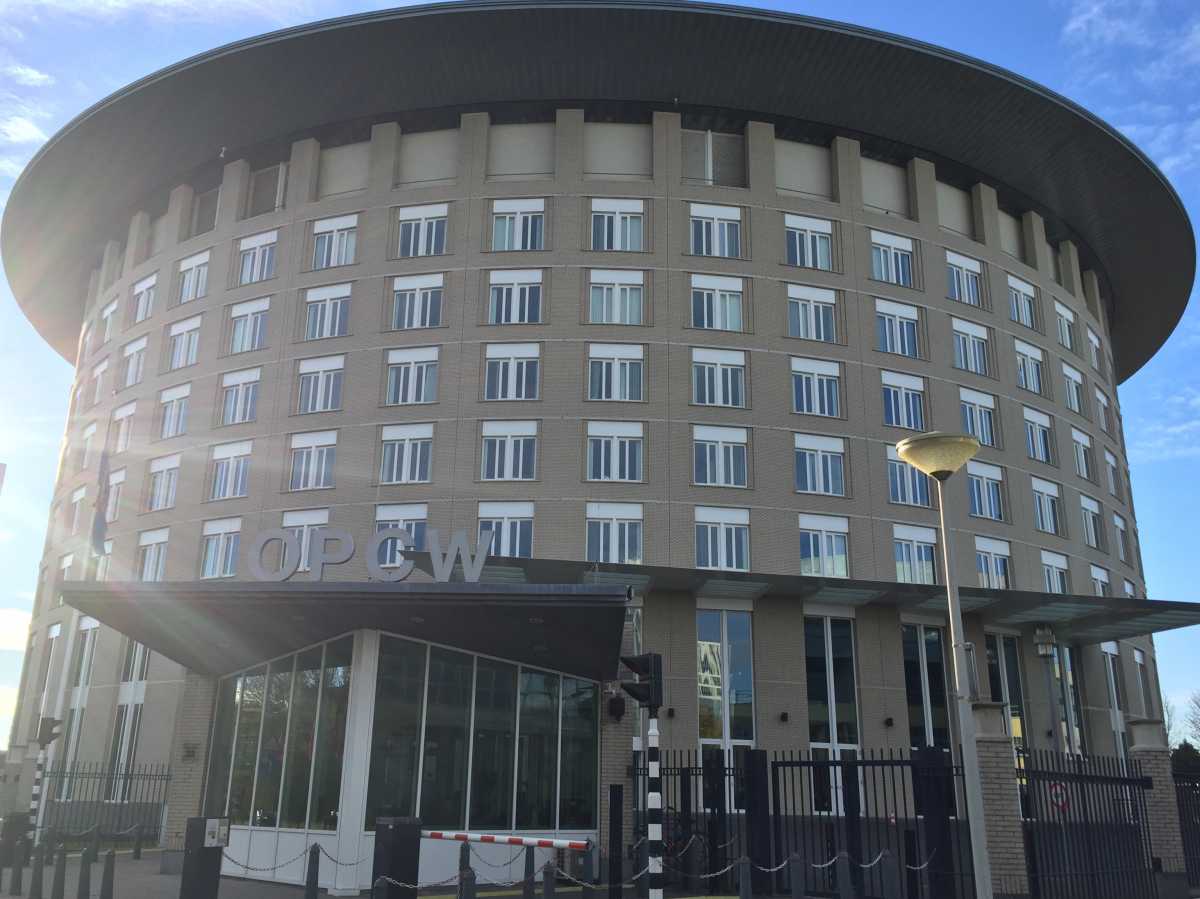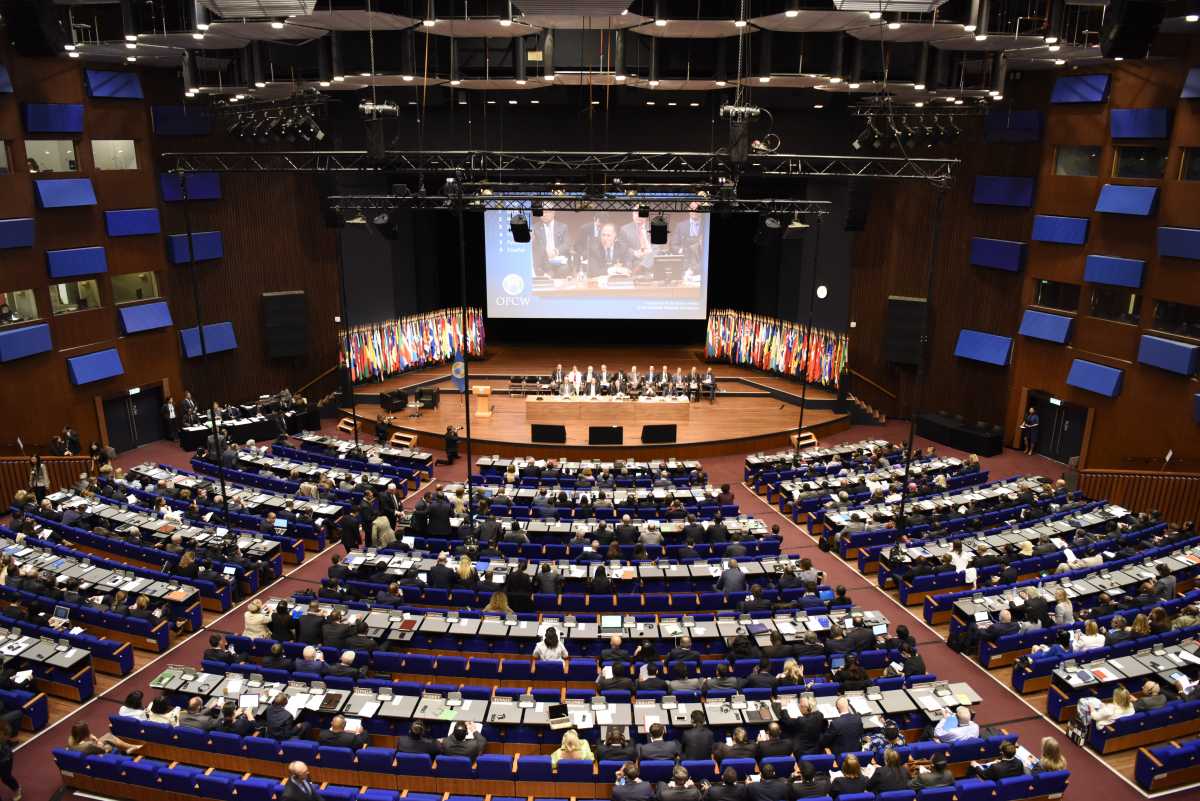Through the following blog series, Arms Control Association research assistant Alicia Sanders-Zakre will be providing ongoing reports and analysis from the Chemical Weapons Convention Conference of States Parties and Review Conference from November 21-30.
States Fail to Agree to Final Review Conference Document
December 3, 2018
States-parties to the Fourth Review Conference were unable to agree to a final consensus document by the end of the conference due to disagreements over language around Syrian chemical weapons use, the joint-investigative mechanism and attribution for chemical weapons attacks. Syria specifically opposed any reference to the joint-investigative mechanism findings in the final text.
“We should be under no illusion as to why we have not reached consensus,” stated the UK representative to the OPCW on Nov. 30. “A very small minority who have used, or defended those that use, chemical weapons have obstructed our efforts.” For its part, Russia accused the West of breaking consensus.
In a joint declaration by France and 65 other countries, member states rejected the use of chemical weapons and called for the strengthening of the CWC’s verification regime.
In lieu of a consensus report by states parties, the chair of the Review Conference Ambassador Agustín Vásquez Gómez from El Salvador issued a summary of the proceedings under his own name.
States parties did succeed in adopting a final report of the Conference of States Parties on Thursday afternoon, after the conference was suspended the previous week due to difficulty in agreeing on final report language.
In additional to the final reports of the conference of states parties and review conference, several states introduced notable working papers to the conference.
Lithuania and Poland introduced a working paper highlighting the concerns posed by sea-dumped chemical weapons. To address this issue, the OPCW technical secretariat and CWC states parties could consider “enhancing the OPCW role as a platform for dialogue and voluntary cooperation, including through information sharing, raising awareness and projects/initiatives among States Parties, international organisations, academia, the relevant industries and NGOs” the paper suggests.
Thirty-six countries, including France, the United Kingdom and the United States, co-sponsored a working paper condemning the use of chemical weapons over the past five years and stressing the need to hold those responsible accountable. The working paper recommended including language condemning Syrian and Islamic State use of chemical weapons in the Review Conference final document.
Switzerland introduced a working paper to strengthen the CWC’s verification regime, including by encouraging formal discussions to clarify the status of Central Nervous System-acting chemicals under the CWC and for the technical secretariat to start preparations for verification activities relevant to CNS-acting chemicals should it need to investigate alleged use.
OPCW Director-General Fernando Arias, as invited in the June special session of CWC states parties, also submitted proposals to strengthen the capacity of the secretariat to better implement the CWC and to help states parties to do so.
Arias’ recommendations include:
- Completing a center for chemistry and technology to ensure that the OPCW’s sampling and analysis capabilities remain up to date;
- Expanding the OPCW’s use of open-source analysis, in part to help the OPCW clarify the completeness and correctness of states’ declarations;
- Establishing an inter-divisional group to help the OPCW to prepare for new states with chemical weapons to join the treaty;
- Placing a greater emphasis on the OPCW’s role in countering chemical terrorism;
- Reconsidering the OPCW’s tenure policy to ensure that the organization has the necessary human resources to tackle the challenges it faces.
In conclusion, the Fourth CWC Review Conference came at a time of increased division among states parties, particularly over the use of chemical weapons in Syria and attributing blame for chemical weapons attacks. The two conferences took forward the attribution mechanism by passing a budget including funds for the investigations as well as supplemental funds. Several states even pledged voluntary contributions for attributive investigations.
While the ultimate failure of the review conference to agree to final document sends a negative political signal, the conference of states parties’ success in taking forward funds for attribution to hold chemical weapons users accountable is a notable gain for the CWC and the global norm against chemical weapons use. —ALICIA SANDERS-ZAKRE
General Debate Generates Tension, Fresh Ideas
November 26, 2018
The general debate during the first few days of Fourth Review Conference to the Chemical Weapons Convention (CWC) was marked by doubts from the United States about Iranian compliance with the treaty, as well as several constructive proposals to update and implement the convention.
U.S. Concerned About Iranian Compliance
In the U.S. national statement, delivered Nov. 22 by Kenneth Ward, permanent representative to the Organization for the Prohibition of Chemical Weapons (OPCW), the United States condemned alleged noncompliance with the CWC by three states parties: Syria, Iran and Russia. While the United States condemned Syrian and Russian violations of the accord at the last meeting of CWC states, it did not express concern about Iranian noncompliance in its statement at last year’s meeting.
Specifically, the United States stated that it “has had long standing concerns that Iran maintains a chemical weapons program that it has failed to declare to the OPCW” and that it is “concerned that Iran is pursuing Central Nervous System Acting Chemicals for offensive purposes.”
The United States then cited three examples of Iran’s “declaration failures”: first that Iran failed to declare its transfer of chemical weapons to Libya in the 1980s, second that Iran has not declared all of its riot control agents to the OPCW, and third that Iran failed to submit a complete chemical weapons production facility declaration, specifically a filling capability.
In a right of reply on Nov. 23, Iran dismissed the allegations and instead charged the United States of violating the treaty by imposing sanctions that impede Iran’s access to the peaceful applications of chemistry, including medicine.
While experts are aware of most of the declaration concerns cited by the United States, it is not clear on what basis the United States stated its concerns about Iran’s ongoing chemical weapons program or its pursuit of offensive Central Nervous System (CNS) acting chemicals. The United States was the only country to express its concerns about Iranian non-compliance at the conference, although many other states expressed concern about Syria and Russia.
The 2018 U.S. State Department report on compliance with arms control agreements stopped short of declaring Iranian non-compliance, stating as previous reports have that the U.S. “cannot certify” if Iran has met its obligations under the Convention. However, U.S. Assistant Secretary of State for Arms Control, Verification and Compliance Yleem Poblete has stated that Iran has a chemical weapons program in several public remarks since taking office, including most recently on Nov. 2.
Proposals to Update CWC Gain Traction
Proposals to update the CWC and its implementation, particularly around prohibiting CNS- acting chemicals and updating the official list of banned chemicals, gained traction at the beginning of the review conference.
A Canadian-Dutch-U.S proposal to add two new families of chemicals, including Novichok, the nerve agent used in Salisbury, UK in March by Russia, gained the support of many countries during the general debate. Switzerland, Sweden, Finland and the Czech Republic were among those to support the proposal in their general debate remarks.
The proposal was officially submitted to the OPCW Director-General last month and will be considered by the OPCW Executive Council within the next few months. If the Executive Council accepts the proposal, the amendment will pass unless a state party rejects the decision, in which case the proposal will be considered by all states parties at the next meeting.
States put forward a range of ideas to address the threat posed by CNS-acting chemicals, which some countries are researching for use in aerosolized form for law enforcement. The United States suggested that all countries adopt a strict non-use national pledge of aerosolized CNS-acting chemicals. New Zealand announced that it already had a national position of not developing, producing, stockpiling or using CNS-acting chemicals.
Switzerland and Australia put forward a proposal, supported by other states including Sweden, to add language in the final review conference document on CNS-acting chemicals. The additional language on CNS-acting chemicals will likely be voted on before the final review conference document is supposed to be adopted by Nov. 30.
Dozens of states called on the OPCW to improve its gender and geographic representation balance. The representative from the Philippines pointed out that the Asian block was underrepresented on the 41-member OPCW Executive Council, given that it had more members than the Western European states, but was allocated fewer seats. Ambassador Sabine Nölke of Canada noted that there were 11 men and one woman seated on the stage at the review conference. “We can do better,” she said.
New Voluntary Contributions Announced
In addition, several countries announced voluntary contributions to the work of the OPCW for particular projects. Denmark, Sweden and the United Kingdom earmarked contributions for the investigations to determine the perpetrators of chemical weapons attacks, of 80,000 euros, 2 million kronor and 1 million pounds respectively. Canada, France and Belgium pledged 7.5 million Canadian dollars, 1.2 million euros and 2 million euros for a new OPCW chemistry and technology center. The Netherlands volunteered 2.3 million euros to buy land for additional OPCW laboratories.
Review Conference Continues
The review conference continues through Friday, Nov. 30, by which time delegates will seek to adopt a final review conference document. During the general debate, several representatives emphasized the importance of adopting a final review conference document by consensus, given the division in the adoption of key documents during the conference of states parties. However, some observers are unsure if the conference will succeed in adopting the final document at all with the division. —ALICIA SANDERS-ZAKRE
Prepared Remarks to the 4th Chemical Weapons Convention Review Conference
November 23, 2018
Mr. Chairman, Director-General, Distinguished Colleagues, Ladies and Gentlemen:
The Chemical Weapons Convention regime has accomplished much in the past two decades to eliminate chemical weapons and reinforce the decades-long norm against their use.
The Organization for the Prohibition of Chemical Weapons has verified the destruction of more than 96% of declared chemical weapons stockpiles; only a portion of the U.S. declared arsenal remains to be neutralized. From 2013-2016, the OPCW oversaw an impressive and unprecedented multilateral effort in Syria to remove and destroy over 1,300 metric tons of chemical weapons in an active conflict zone.
And yet, the delegates here face serious challenges to the CWC and the global norm against the use and possession of chemical weapons. Tackling those challenges requires a renewed spirit of cooperation, a reaffirmation of the CWC, and compliance with the treaty by all states-parties and stakeholders.
Four countries – Egypt, Israel, North Korea and South Sudan - still need to join the Convention in order to achieve universality. Amongst States-Parties, there are concerns about the completeness and correctness of declarations to the OPCW, making the work of the Declaration Assessment Team to resolve the inconsistencies and gaps in Syria’s declaration of paramount importance.
The United States also needs to complete the destruction of its remaining prohibited chemical stockpiles no later than the adjusted destruction deadline of 2023 in a manner consistent with applicable environmental and safety standards.
But the greatest immediate threat posed to the CWC regime is undoubtedly the appalling use of chemical weapons. The Syrian people have been plagued by hundreds of devastating chemical weapons attacks since the start of the brutal civil war in their country.
The Fact-Finding Mission’s independent investigations into alleged instances of chemical weapons use have been invaluable. Before a state-party blocked the extension of its mandate, the UN-OPCW Joint Investigative Mechanism (JIM) attributed responsibility for six attacks1. The total numbers are likely much higher.
Since the last review conference, another CWC state-party has violated its obligations under the convention by using the nerve agent Novichok to poison Yulia and Sergei Skripal in the United Kingdom in March. This state-party’s blatant disregard for its obligation not to possess or use chemical weapons, as well as its reported attempt to hack into the OPCW in April, should be unequivocally condemned.
In light of recent events, we welcome the push by Canada, the United States and the Netherlands, to add Novichok to Schedule 1 listed chemicals in the CWC to ensure the treaty remains robust and adaptive to current threats.
Mr. Chairman,
With the failure to extend the UN-OPCW Joint Investigative Mechanism in November 2017, the international community lost a fundamental tool to independently assess cases of chemical weapons use, which is essential to efforts to hold those responsible to account.
As the international community struggled to develop another method to investigate and identify chemical weapons users, the French-led International Partnership Against Impunity for the Use of Chemical Weapons played an important role to help share information between governments and to “name and shame” those involved in chemical weapons attacks.
We applaud the decision last June by States-Parties to allow the Director-General to investigate and identify the perpetrators of chemical attacks.
As Director-General Arias said in an interview in September: “Those responsible [for chemical weapons attacks] should now have nowhere to hide and should be held accountable by the international community for breaking the global norm against chemical weapons.”
We fully agree. The Arms Control Association encourages the Director-General to establish a mechanism to take forward the attribution mandate as soon as possible. This conference should see that the mechanism is adequately funded and supported.
Achieving universalization and full compliance with the obligations of the CWC is in the interest of all States-Parties. The regime is the product of international cooperation and can only survive with greater partnership amongst states parties.
Thank you for your attention. I would like to request that this statement be made part of the final Review Conference record and posted on the OPCW website.
1In 2016, the JIM reported that the Syrian government was responsible for chemical weapons attacks in Talmenes in April 2014, and in Sarmin and in Idlib province in March 2015. and found that the Islamic State was responsible for an attack using sulfur mustard in Marea in August 2015. In 2017, the JIM concluded that the Syrian government used Sarin in an April 4, 2017 attack in Khan Shaykhun, and that the Islamic State extremist group was responsible for using sulfur mustard on September 15 and 16, 2016 in Um-Housh, Syria.
Conference of States Parties Tackles Attribution
November 21, 2018
In an unusually contentious Conference of States Parties to the Chemical Weapons Convention (CWC) states sparred on taking forward the attribution mechanism of states parties mandated in a June special session of states parties. The Conference, which was scheduled to end on Nov. 20, was suspended late Tuesday night because it could not agree to a final report, and will conclude its work sometime before the end of the Review Conference.
Russian and Chinese Draft Decision Rejected
The morning of Nov. 19 began in flurry as states parties addressed a draft decision by Russia and China, “Enhancing the Integrity of the Organization for the Prohibition of Chemical Weapons,” which would have created an open-ended working group to review the attribution mechanism, according to national statements.
Most states that spoke about the Russian and Chinese draft on Monday expressed opposition to the text, claiming that it undermined the June decision, while others expressed concern that Russia and China had not consulted with other states before introducing the text on the Friday before the conference began.
Russia and China stated separately that the draft decision was not intended to overturn the June decision, but rather to allow states to resolve differences on how to implement it.
Venezuela and Pakistan were among the few others to speak out in support of the Russian and Chinese draft decision and against a new body to investigate perpetrators of chemical weapons use. "What is hampering the spirit of cooperation is the attribution mechanism," said Pakistan.
On Tuesday, the conference rejected the draft decision by a vote of 82-30 with 31 abstentions. The thirty states to vote in favor of the decision were: Algeria, Angola, Armenia, Belarus, Bolivia, Burundi, China, Comoros, Congo, Cuba, the Democratic Republic of the Congo, India, Iran, Kazakhstan, Kyrgyzstan, Lao, Mozambique, Myanmar, Nicaragua, Pakistan, Palestine, Russia, South Africa, Sudan, Syria, Tajikistan, Uzbekistan, Venezuela, Vietnam and Zimbabwe.
States Adopt OPCW Budget
States succeeded in adopting a program and budget for the Organization for the Prohibition of Chemical Weapons (OPCW) in 2019 by a vote of 99 in favor and 27 against, after a protracted debate on amendments.
When the OPCW Executive Council met in early November, it failed to reach consensus on a budget to recommend to the Conference of States Parties (CSP), foreshadowing difficulty adopting a budget at the Conference this week.
The Russian and Iranian proposed amendments would have gutted the budget’s allocated funds for the attribution mechanism, but the amendments were struck down in a series of votes on Tuesday.
In explaining why it had voted against the budget, China stated that the budget should have been adopted by consensus instead of being “forced to a vote.” Voting on the budget could “compromise” the work of the OPCW and the upcoming Review Conference, China added.
The Conference also voted to establish a special fund for cyber security and one for the necessary technological infrastructure to implement the June decision. The CSP elected the next representatives to the OPCW’s Executive Council, including representatives from Cameroon, Kenya, Morocco, Kenya, Bangladesh, China, India, Japan, the Republic of Korea, Saudi Arabia, Bulgaria, Romania, Argentina, Brazil, Mexico, France, Italy, the United Kingdom and the United States.
Fourth Review Conference
The Fourth Review Conference to the Chemical Weapons Convention starts Nov. 21 and will run until Nov. 30. Documents and national statements from both the Conference of States Parties and Review Conference will be uploaded onto the OPCW website when they become available. —ALICIA SANDERS-ZAKRE
Preview: CWC States Parties Must Fund Attribution at Upcoming Meeting
November 16, 2018
As members of the global regime against chemical weapons convene next week, they must overcome Russian resistance to push forward the new mechanism for assigning blame for chemical warfare.
Specifically, delegates to the Chemical Weapons Convention (CWC) Review Conference and Conference of States Parties (CSP) will decide if the budget for the Organization for the Prohibition of Chemical Weapons (OPCW) funds such investigations. They will also likely hear proposals from the Director-General on strengthening CWC verification provisions.
Taking forward attribution is crucial for two reasons. First, since the third Review Conference in 2013, North Korea (not a CWC party) and Russia used chemical agents for assassinations in Malaysia and the United Kingdom respectively, and the Syrian regime has persistently used chemical weapons against its own people over the past five years, with independent estimates running as high as 200 attacks involving chemical weapons.
Second, Russia and Syria continue deny responsibility for blatantly disregarding the CWC, instead espousing conspiracy theories when confronted by investigations and accusations. In November 2017, Russia vetoed a joint UN-OPCW mechanism from continuing to investigate and assign blame for chemical weapons attacks in Syria. Prior to Russia’s veto, the body concluded that Syria was behind four chemical weapons attacks and the Islamic State was responsible for two.
When the international community finally succeeded in finding an alternative to the UN-OPCW mechanism by convening a special session of the Conference of States Parties in June - the fourth in the CWC’s history - Russia decried the body’s decision to give the director-general the mandate to assign blame for chemical attacks as “illegitimate.”
Since June, Russia has used every opportunity to debase and undermine the new attribution mandate, including at the UN General Assembly First Committee when it voted against an annual resolution on the CWC. Last week, Russia raised objections to the OPCW draft budget for 2019, which included a proposition to fund the attribution mechanism by using a portion of the OPCW’s 2016 cash surplus. Nevertheless, the proposal passed, with 29 countries voting in favor, three against (Russia, China and Iran) and seven abstaining. The budget will be considered by the CSP when it convenes before the Review Conference from Nov. 21-22. CWC states parties must not be cowed by foreseeable Russian obstructionism. They must insist on including funding for an attribution mechanism in the OPCW budget.
New OPCW Director-General Fernando Arias has already started to implement the June decision. In an October interview with Arms Control Today, Arias announced that he had established a task force for this purpose by consulting with relevant international organizations to assess the resources and organizational structures needed. Arias also created a new office for attribution, including a head of investigations and a few investigators and analysts, to report directly to him.
“As attribution can serve to deter the use of chemical weapons, this is one way that we are implementing our mandate to prevent the re-emergence of chemical weapons,” he said. “We need to take an integrated approach to this issue, using our current skills and recruiting new staff and resources to meet demands for specific skill sets.”
Arias will also likely present proposals on how to strengthen the CWC’s verification regime and better assist states-parties to implement their obligations, as invited to by the June special session decision.
CWC states parties’ continued dedication to implement the June decision is of paramount importance as investigations will continue to face stiff Russian opposition. States parties should encourage Arias to finish establishing the attribution mechanism as soon as possible. Already, a year has passed since the last independent, investigative body to assign blame for chemical weapons attacks was struck down. There is no time to lose. —ALICIA SANDERS-ZAKRE
